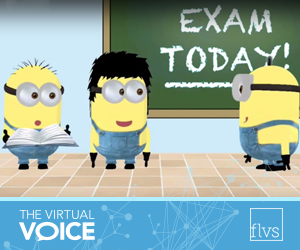The FLVS Minions
 Young adolescents require drastically different and unique approaches to education.
Young adolescents require drastically different and unique approaches to education.
Middle school educators have always understood that the biological events of puberty fundamentally disrupt the somewhat smooth development of elementary school years and has a profound impact upon the cognitive, social, and emotional lives of young teens.
In line with this important insight, educators see the need for the delivery of special instructional and administrative changes in the way that education takes place for kids in early adolescence.
In brick-and-mortar schools, those changes were the establishment of a mentor relationship between teacher and student, the creation of small communities of learners, and the implementation of a flexible interdisciplinary curriculum that encourages active and personalized learning.
FLVS has always had a flexible and personalized learning environment conducive to middle level learners. In 2015, Marie Mitchell, principal at FLVS, pioneered a unique program that would meet the special developmental needs of early adolescents. She believed it was essential to escalate our current practices and work on strategies that would benefit our unique learners. She assembled teachers from Language Arts and Social Studies to team up and share the same students.
These students were called “The Minions,” and were part of many new programs at FLVS.
This included advisor/advisee mentorships, virtual learning with students from London, a student council which sponsored Virtual Movie Night, community projects, and collaboration lessons formed in a virtual office. I was the lead teacher in charge of making sure these students felt included and part of a smaller team. Due to this type of virtual teaming, the kids felt a more personal adult relationship and that their voices were heard. There was more engaged learning.
This was proven by the fact that these teachers had the highest numbers of participation in live lessons, effective and academic activities at FLVS. These activities are voluntary, yet “The Minions” enjoyed them and attended them more than other virtual students. Team Minion had more positive role models in this program due to the fact that the two teachers shared 150 students. They had two lead teachers, a principal, and older student ambassadors to communicate with and assist in their schooling.
Middle School students, age 9-15, are entering the emotional turmoil of adolescence and are arriving at a major shift in their ability to think. Now, for the first time, they can focus on thinking itself and reflect on what they are learning. Helping students use their new mindset in reflecting on school, learning study skills, and setting goals for themselves is the type of metacognitive strategies we teach on Team Minion. We do this through constant telephone calls, text, emails, Facetime, Skype, and Blackboard Collaborate meetings.
Quality middle schools allow student initiated learning and student-shaped school activities.
Minion Council was formed to allow virtual education students to provide meaningful feedback of their school environment. The online student-led team initiated fun activities like Bring a Pet to School Day and Crazy Sock and Hat Day. They also pioneered community activities such as gathering donations for Toys for Tots and making valentines for senior citizens.
Recent achievement dialogue has placed social and emotional progress on hold while the focus is on tests and academic scores. Effective middle schools teach both to help students develop their emotional intelligence and their intrapersonal and interpersonal intelligence (Gardner, 1993; Goleman, 1997). They use cooperative learning as a key to fostering positive social relationships.
FLVS engages students in curriculum-related activities that serve to develop their social and emotional intelligence. We use a virtual office to create things like flipped lessons, to collaboratively write argumentative essays, or even to participate in poetry parties.
Before the academic collaborate activity, “The Minions” engage in social or advisor/advisee lessons.
These events include Virtual Recess, Grammar Giggles, goal setting, and self-esteem activities. Since the “emotional brain” is particularly active at this age, we wanted to build into the curriculum topics that have emotional and engaging content (Gottman & Declaire, 1998).
FLVS has strong academic standards and still understands the developmental needs of teens, and in particular their neurological, social, emotional, and metacognitive growth. These middle school values can be implemented in the virtual world, too.
Resources
Gardner, H. (1993). Multiple intelligences: The theory in practice. New York: Basic Books, Inc.
Gottman, J., & Declaire, J. (1998). Raising an emotionally intelligent child.New York: Simon & Schuster.
Image credit: Minions School Exam, https://www.youtube.com/watch?v=Ge_fqFHcXQA
Post by: Terri Golden, FLVS Lead Teacher, MJ Lanuguage Arts 1
